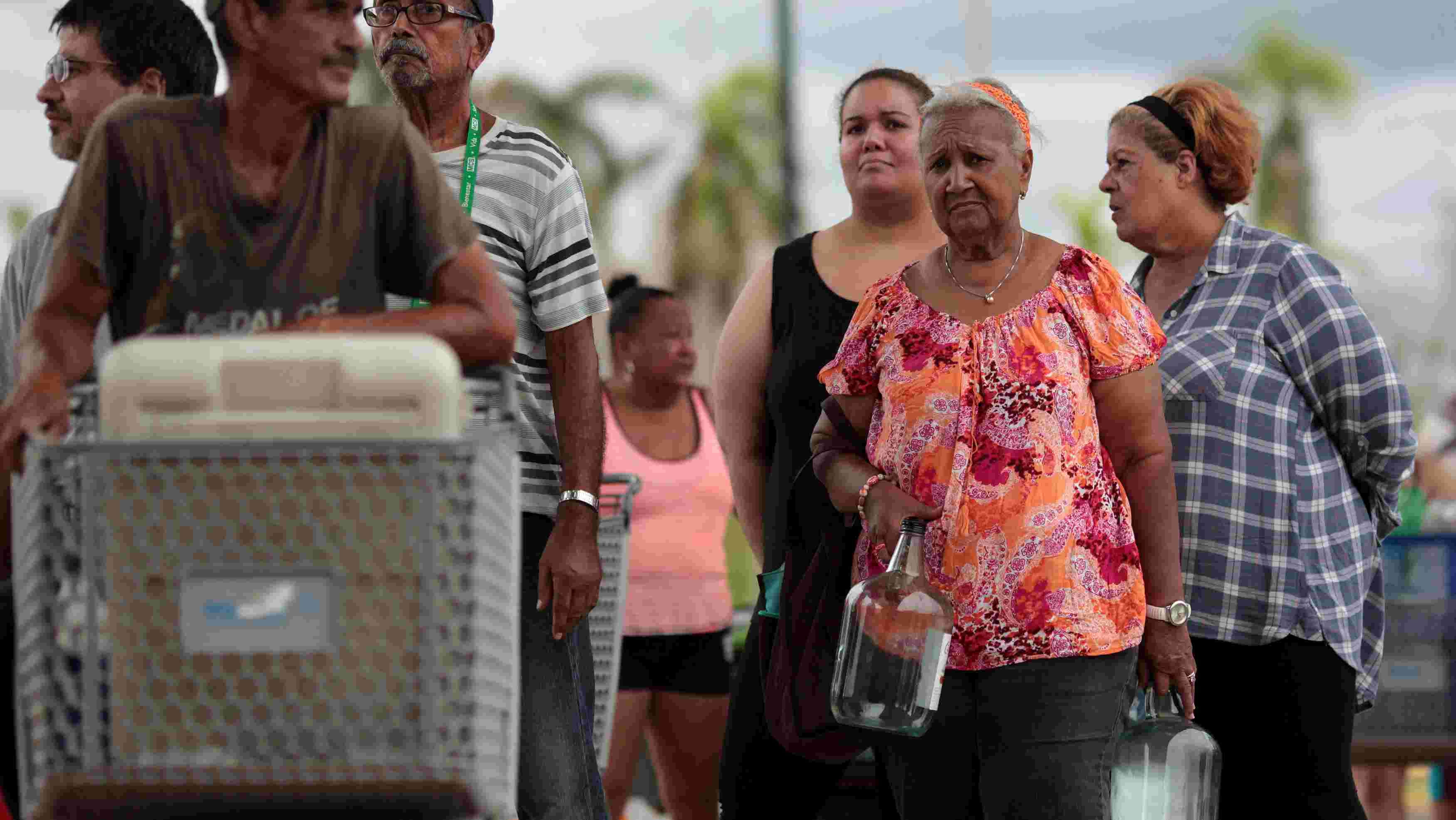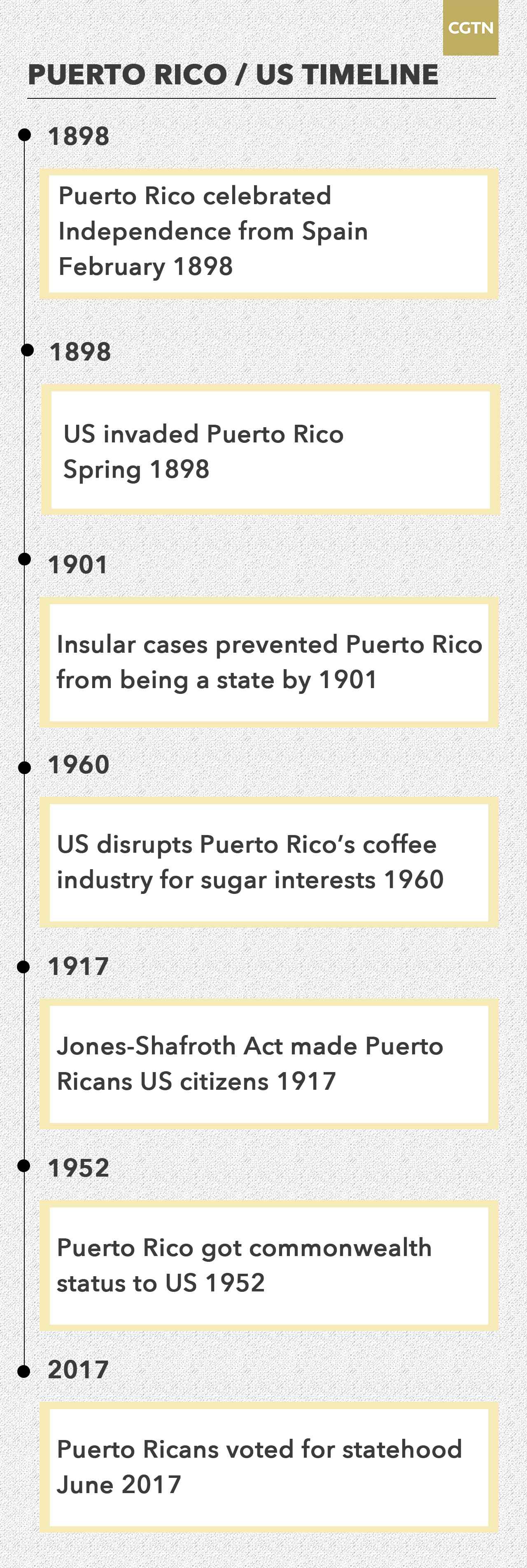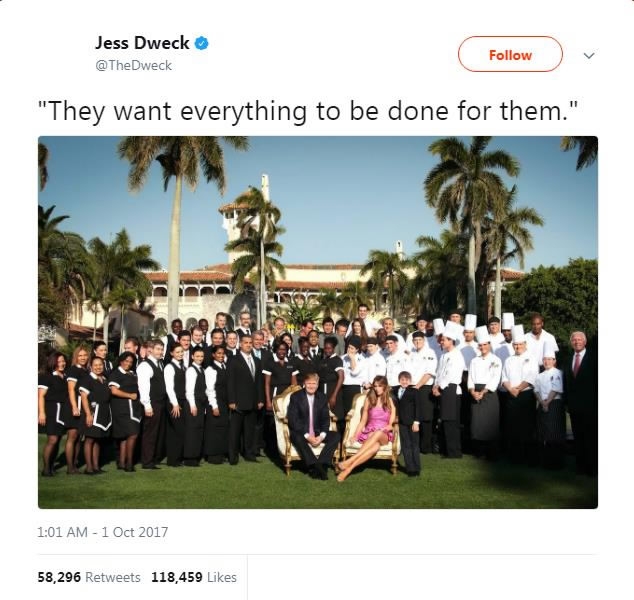
Politics
16:25, 03-Oct-2017
A look at Puerto Rico’s complicated history with the US
Ty Lawson

The relationship between the United States and Puerto Rico has a long, complicated and ambiguous standing. The recent slow response in the aftermath of Hurricane Marie has made things that much more tense.
US President Donald Trump visited Puerto Rico Tuesday, nearly two weeks after Marie devastated the US territory.
The Puerto Rico-US relationship dates back to 1898. According to Lillian Guerra, a history professor at the University of Florida, the US invaded Puerto Rico not only because it was a Spanish territory, but also due to its interests in developing a sugar market there.
Puerto Rico / US relationship timeline:

CGTN Digital
CGTN Digital
Twitter tirade
Adding to the complications is his recent tirade of tweets lashing out at the storm-ravaged island. Over the weekend, he sent out 18 tweets between 7 a.m. and 6 p.m. on Saturday bashing Puerto Rico.
"The Mayor of San Juan, who was very complimentary only a few days ago, has now been told by the Democrats that you must be nasty to Trump," Trump stated. "Such poor leadership ability by the Mayor of San Juan, and others in Puerto Rico, who are not able to get their workers to help," he added. "They want everything to be done for them when it should be a community effort."
But US citizens CGTN Digital spoke with disagree with the president’s tweets.
“At the end of the day people need help no matter if they are Puerto Rican, Dominican or European,” said June Soto, a US Citizen of Puerto Rican descent.
“It’s been difficult to contact all of my family,” she said. “My grandfather is still missing.”
The storm has given new momentum to a decades-old debate — whether or not Puerto Rico should be a US state.
Puerto Rico’s status as a US commonwealth means its 3.5 million American citizens do not pay federal taxes, vote in presidential elections or receive federal funding on programs like the Medicaid health insurance system for the poor.
“I think it would be better than what we are now,” said Fermin Seda, a Puerto Rico resident.
What US citizenship means for Puerto Ricans:

CGTN Digital
CGTN Digital
State of affairs
According to Reuters, Puerto Ricans voted overwhelmingly in favor of statehood in June, with 97 percent support, although the turnout was less than a quarter of eligible voters.
But for Soto, Puerto Rico’s current crisis is less about statehood and more about actually caring.
“Trump has the means to get wherever he wants to go,” Soto said. “He was very entertained by the whole kneeling thing with the NFL.” She is referring to the president's barrage of tweets criticizing professional football players who kneeled in protest during the US national anthem.
“Let’s be very clear anything Trump finds of importance he always tweets about that. It was like four or five days later he tweeted about Puerto Rico,” Soto said. “It would have been better for him to go earlier instead of two weeks later.”
Anelise Acevedo, a student we spoke to from St. John’s University in New York City said, “The fact that we still can’t get in touch with our family is evidence of the lack of recovery Puerto Rico is experiencing.”
Citizens all across the US are expressing similar frustrations about the slowed and/or lack of response. President Trump tweeted about local officials in Puerto Rico, accusing them of wanting “everything to be done for them,” one TV writer fired back.
Jess Dweck posted a 2011 photo of the Trump family at the president’s ultra-lavish Mar-a-Lago Club in Palm Beach, Florida. The original picture included the caption “household staff.” Dweck replaced the caption with Trump’s tweet, “they want everything done for them.”

Twitter/@TheDweck
Twitter/@TheDweck

SITEMAP
Copyright © 2018 CGTN. Beijing ICP prepared NO.16065310-3
Copyright © 2018 CGTN. Beijing ICP prepared NO.16065310-3